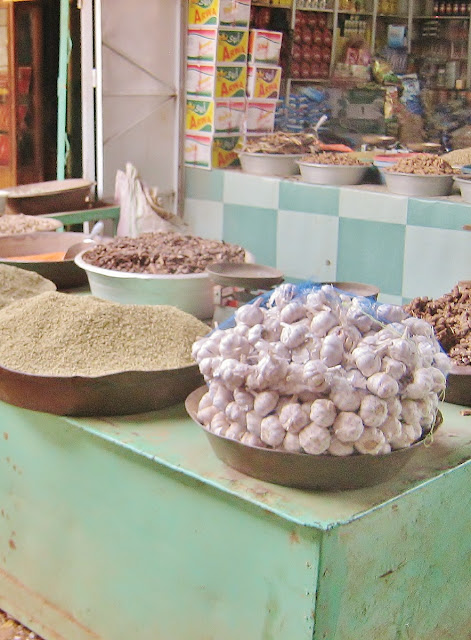Teaching English in Sudan
During 2008, I spent nearly 6 months in Khartoum, Sudan, as an EFL teacher. Sudan is not your typical tourist destination. Most of the expat community either work for NGO's or for oil companies and are not there for pleasure. There are rarely tourists who visit Sudan, due to safety considerations. It is not a place where one can freely walk and happily snap away pictures. I found visiting souqs to be the exception to the rule. In this photo expose I focus on the souqs or markets that I frequented in Khartoum and Omdurman.
 |
| Spices for sale - Omdurman souq |
About Sudan
Sudan (Arabic: السودان Al-Sudan) is the third largest country in Africa and sixteenth largest in the world, bordering Egypt, Eritrea, Central African Republic, Chad, Ethiopia, Libya, and South Sudan. Sudan is afflicted by civil wars which have been raging, on and off, for more than 40 years. When the colonial map-makers divided up Africa, they included in Sudan the predominantly Muslim people of the north (including Nubians), who share much of their history and culture with Egyptians and Arabs, and the largely Christian and Animist Nilotic and Bantu people of the south, who have more in common with the rest of sub-Saharan Africa than with their northern neighbours (Wikitravel).
About Khartoum
Khartoum (Arabic: الخرطوم Al-Khartum) is the capital of Sudan and is located where the Blue Nile and White Nile Rivers merge. The huge, spread-out city is actually made out of three distinct cities (Khartoum, Khartoum North or Bahri, and Omdurman) which are divided by the Nile and its two arms. The Blue Nile flows between Khartoum and Bahri, the White Nile between Khartoum and Omdurman, and the merged Nile between Bahri and Omdurman. The confluence of the Blue and White Nile, known as Al-Mogran, lies just north of the bridge between Khartoum and Omdurman (Wikitravel).
About Omdurman
Omdurman (standard Arabic: أم درمان Umm Durmān) is the second largest city in Sudan and Khartoum State, lying on the western banks of the River Nile, opposite the capital, Khartoum. Omdurman has a population of around 3 million and is the national center of commerce. With Khartoum and Khartoum North or Bahri, it forms the cultural and industrial heart of the nation (Wikipedia).
What is a souq?
A souq or souk, also spelled shuk, shooq, soq, esouk, succ, suk, sooq, suq) is a marketplace or commercial quarter in Western Asian and North African cities. The equivalent Persian term is "bazaar". A souq was originally an open-air marketplace. Historically, souqs were held outside cities at locations where incoming caravans stopped and merchants displayed their goods for sale. Souqs were formed whenever a caravan or caravans arrived. Since this might be infrequent, souqs often extended beyond buying and selling goods to include major festivals involving various cultural and social activities. Any souq may serve a social function as being a place for people to meet in, in addition to its commercial function (Wikipedia).
 |
| Spices for sale at a local souq in Buri nearby my home |
 |
| Buri Souq |
 |
| On one of the main roads in Khartoum, goats are on display alongside the road to be sold |
Omdurman Souq
The largest and most famous souq in Sudan
 |
| Little boy at his father's shop - Omdurman souq |
 |
| Omdurman souq scenery - soccer fans on a bus driving by celebrating |
 |
| Scooter and corn - Omdurman souq |
 |
| Omdurman souq |
 |
| Omdurman souq |
 |
| Omdurman souq |
Khartoum-North souq (Saad Gishra)
This is a covered market place, and it is Bahri’s main shopping market. Prices here can be a little higher than those in souq Omdurman however it is much more easily navigable for tourists.
 |
| A friend, Justine buying freshly squeezed fruit juice at a market in North Khartoum |
 |
| Khartoum North souq |
 |
| Khartoum North souq - a tailor fixing Justine's handbag |
 |
| Khartoum North souq - spices galore |
 |
| More Spices |
 |
| Khartoum-North souq |
 |
| Khartoum-North souq |
 |
| Khartoum-North souq |
 |
| Khartoum-North souq |
 |
| Khartoum-North souq |
 |
| Khartoum-North souq |
One can almost find anything possible at the souqs, from clothing and cheap plastic household items to food and jewelry. They are also much cheaper than in regular shops. But one must go there for the sights the sounds and the smells, it is where one can find the heart of the people and the city. It is a fantastic opportunity to engage with locals. It was one of my favorite outings in Sudan. It was safe, cheap, fun, relaxing and one could take photos freely. This is an authentic cultural interaction opportunity you should not miss, whether you stay in Khartoum or whether you are just passing through.






















No comments:
Post a Comment